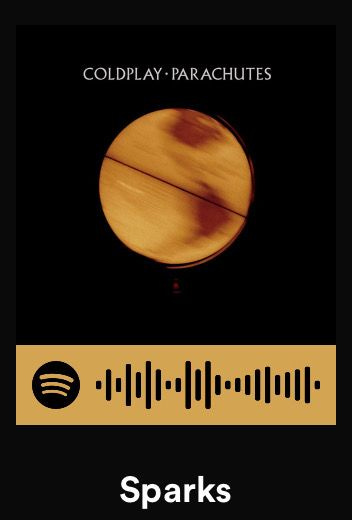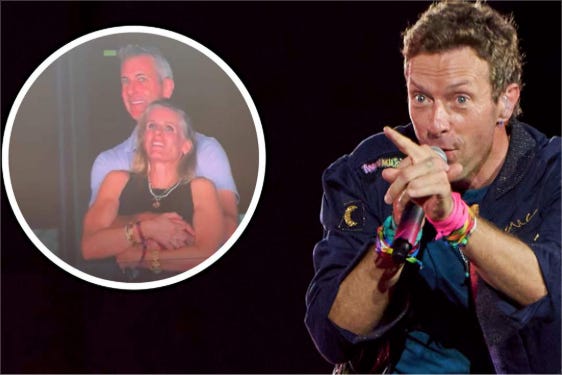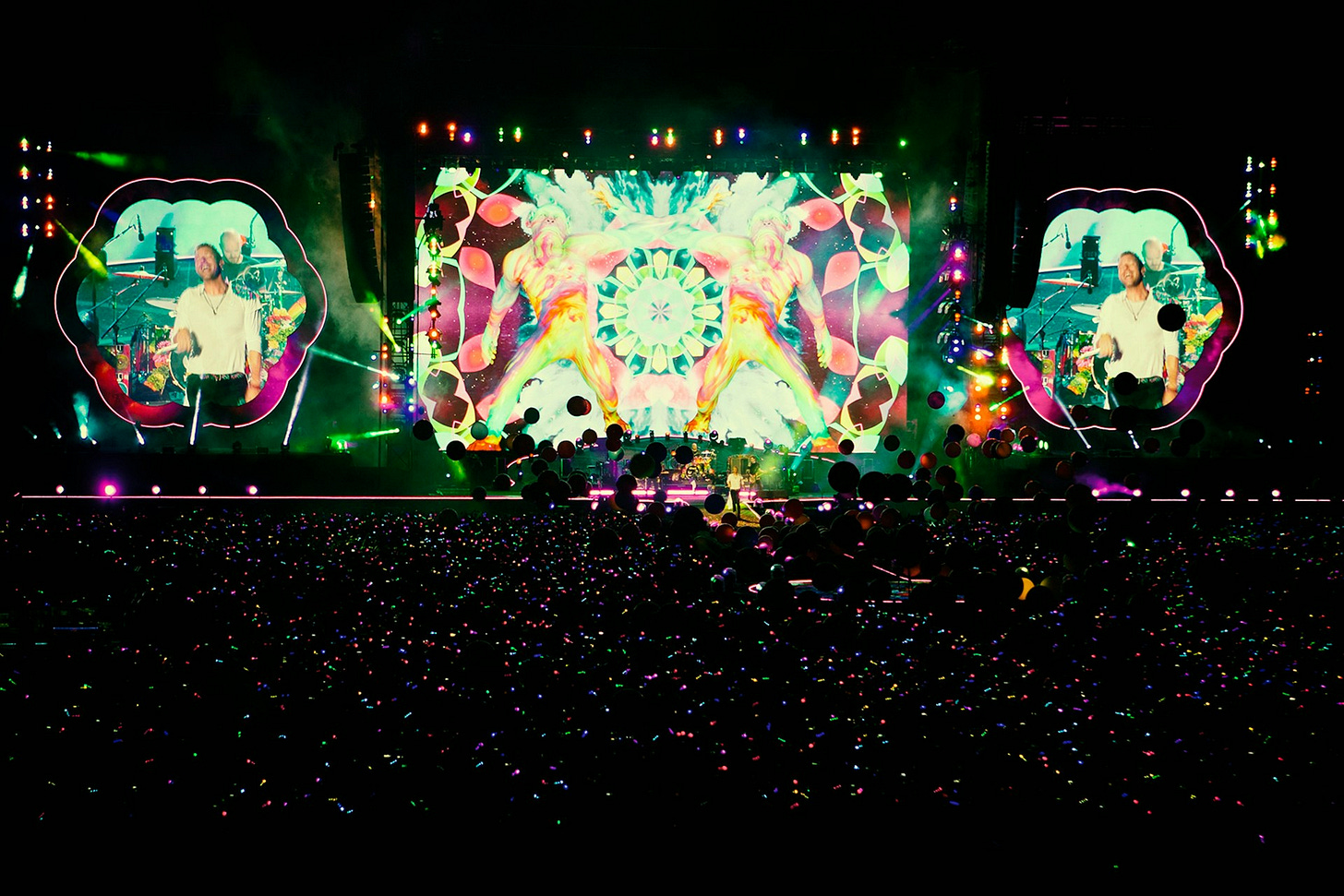Look at the stars, look how they stream for you
Just how much money is ‘going to Coldplay’
When do you reckon the song Sparks by Coldplay peaked on Spotify streams?
A lovelorn deep cut from their debut album Parachutes, released back in 2000, Sparks has quietly become one of the band’s most enduring tracks. It wasn’t a single. Until the current world tour it wasn’t a regular feature on their set lists.
Now obviously you couldn't stream anything on Spotify before the streaming service launched in Sweden in October 2008, the UK in February 2009 and entered the USA in 2011.
In which week or year do you think Coldplay's saw more plays and thus more money from this specific song?
Was it as soon as the millions of Coldplay fans first signed up to the streaming service and leapt at the chance of listening to their favourite band? Was it when algorithms first started recommending popular catalogue tracks through personalised playlists like Discover Weekly (2015) or Daily Mix (2016)?
Was it thanks to a catalogue echo and halo effect around the time the band released some of their more recent and most popular songs of all time - A Sky Full of Stars (2014), Something Just Like This (2017) or My Universe (2021)?
Sparks, like many evergreen catalogue songs, had a TikTok moment back in June when a fan filmed Chris Martin looking emotional whilst singing it, commenting 'homie is heartbroken'. This triggered millions of likes, commentary on his recent split from Dakota Johnson and an avalanche of user generated content using the track. Was this it's digital zenith?
Or was it perhaps a month later in July 2025 when a Tech CEO and his head of HR got caught cuddling on the Jumbotron causing an international news story and the whole world started using "going to Coldplay" as a euphemism for having an affair?
The truth is, all of these moments will have helped and the song has just kept building and building. It peaked last week with 16.7 million global streams according to kworb.net - or maybe it’ll go even higher this week, or next… not bad for a 25 year old song. A 25 year old song which currently sits at #19 on the UK's Official Top 40, enjoying it's first ever run on the pop charts!
In total Sparks has 1.6 billion streams on Spotify and is currently the 2nd most popular song in the band's catalogue.
The 0.003 Rule: Daily Streams = Annual Dollars
After publishing my post last week about Taylor Swift’s streaming revenue, I noticed a tidy symmetry in the maths. A single day is roughly 0.003 of a year. And Spotify pays rights holders around $0.003 per stream.
So whatever your daily stream count, if you can keep it up, it’s a good proxy for your annual payout.
10,000 streams a day? That’s about $10k a year in value.
1M a day? $1M.
Taylor Swift’s 150M daily streams across all platforms? About $150M a year (I estimated $160M last week but I like the symmetry of my new approach!!)
Coldplay are currently doing 21 million Spotify streams a day, so that’s $21 million a year for them and their record company, $2.4 million for Sparks alone, and likely 3x that for the whole streaming market.
So yes, a 25-year-old deep cut with viral momentum can become a serious revenue driver. But it wasn’t just one viral moment and one big spike, the track has been consistently building momentum for several years, going from 850,000 Spotify plays a day back in 2022 to the current 2.4 million a day. This is the nature of the streaming economy with algorithmic playlisting driving all users eventually to the evergreen catalogue within their taste boundaries. I use the phrase “All roads lead to well known”.
Algorithmic Gravity vs Cultural Serendipity
Spotify’s own data scientists published a fascinating paper in 2020: Algorithmic Effects on the Diversity of Consumption on Spotify. It found that:
Algorithmically-driven listening is significantly less diverse than user-driven (organic) listening.
But more diverse listeners ("generalists") are much more valuable: they’re 35% more likely to subscribe and 25% more likely to stay on the platform.
Users who become more diverse over time tend to shift away from recommendations and toward their own exploration.
There’s a real tension here: the algorithm optimises for short-term satisfaction ("you liked that, so here’s more of it") but long-term user value is driven by diverse discovery. As I’ve mentioned before I’ve started to hesitate before pressing play within Spotify whenever I don’t have time to make active choices - I just can’t bear hearing the same songs over and over again.
It’s not just me. Tiffany Ng, writing for MIT Technology Review, confirms that other users feel stuck too. Streaming platforms can become echo chambers. If you don’t actively fight the algorithm, it stops surprising you.
Coldplay's Catalogue Is a Compound Interest Engine
Sparks is a great case study in how value can emerge long after the moment of creation. And it’s not alone. Coldplay now have over a dozen tracks that have passed the billion-stream mark.
Streaming turns catalogue into compound interest. Each track becomes a digital asset. If it finds new relevance, it can spike again. Sometimes that relevance is artistic. Sometimes it's algorithmic. Sometimes it's just a good meme.
But not everyone benefits equally. Only the biggest artists… or those already surfaced by the algorithm get this compounding effect. Smaller acts often never break through. If they don’t get that first wave, they don’t get added to playlists. And if they don’t get playlisted, they don’t get heard. Their songs can’t go viral if the algorithm never lets them in.
Going to Coldplay
I haven’t seen Coldplay live since 2000. I saw their first headline show at the Scala. Then at T in the Park, where they were booked on a small tent stage just before Yellow blew up. Thousands of us swarmed the tent. We couldn’t get in. So we lifted the canvas flaps at the back and snuck in. I seem to remember Chris Martin got booed for describing how good it felt as the band’s first gig in ‘England’ since they’d had a hit!
Tonight, Coldplay play the final show of the most-attended concert tour of all time. I was meant to be there. A record company friend had invited me to Monday's show, but it got rescheduled. My pal flew out of the country yesterday. My ticket flew with him.
Anyway, my wife is glad that I'm not "going to Coldplay" tonight! 😉
Sources:
Ashton Anderson et al (2020) Algorithmic Effects on the Diversity of Consumption on Spotify
Daniel Cohen (2023) To Monopolise Our Ears: What Spotify Wants
Adam England (2025) Coldplay's classic 'Sparks' charts again after viral TikTok about Chris Martin and Dakota Johnson’s split
Kworb (2025) Coldplay - Sparks - Spotify Chart History
Owen Lloyd (2025) Coldplay set to increase all-time touring attendance record - TheTicketingBusiness News
Official Charts (2025) Official Singles Chart Top 100
Tiffany Ng (2024) How to break free of Spotify's algorithm | MIT Technology Review
Postscript:
In anticipation of going to the gig this week (sob!), I made an imagined setlist playlist on Spotify. 36 Coldplay tracks. You’d think the algorithm might understand the vibe as it suggests more tracks for me to add. Instead, it recommends "Birds of a Feather" by Billie Eilish. No wonder these songs get to a billion plays!






